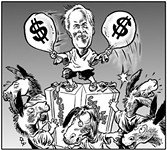Capitol Chronicle
On not paying for public schools: Ratliff's new proposal reshuffles the same short deck
By Michael King, Fri., April 12, 2002
Ratliff's much-anticipated appearance was expected to provide an important potential answer, for it would carry his imprimatur as lieutenant governor as well as his experience in the matter at hand: he was the author of 1993's Senate Bill 7, which attempts to provide constitutionally mandated public school equity by the back door. Under SB 7, wealthy school districts turn over to the state a portion of their local property-tax revenues, which are then redistributed to poor school districts that don't have the tax base to raise such money on their own. (It's important to note that "wealthy" and "poor" in this system are entirely relative terms, and refer explicitly to the value of property, not the wealth of citizens. Austin ISD, for example, where a majority of the students are low-income, is a "property wealthy" district, and will owe the state $92 million this year, $140 million the next.)
As Ratliff acknowledged, nobody much likes SB 7, but since 1993 nobody has offered a better plan: more equitable, more efficient, and (here's the real rub) likely to pass at the Legislature. He seemed not terribly confident that his new proposal -- a statewide property tax to replace the district-level shell-game -- could navigate those rapids. But he offered it as a way of centralizing and simplifying the current finance system, thereby eliminating the most notorious complaint against it, as signified by its "Robin Hood" nickname -- it takes from the rich to give to the poor.
But the poor are hardly to blame for the Lege's baroque solution to a statewide, historical problem of social inequity, which by default the schools are charged with fixing. Better to blame the state's Founding Fathers -- so starry-eyed and idealistic as to put equal access to public education into the Texas Constitution. And then, of course, there's the irritating obligation created by a generation of federal civil rights laws ...
Slaying the Dragon
Aware of the bedrock opposition to anything that smacks of "new taxes," Ratliff was careful to propose a plan that, in principle, is "revenue-neutral." His initial numbers, which will receive much tweaking and debate before (and if) they ever reach next year's session, attempt to push around the table the same amount of property-tax monies currently being spent on Texas schools. Did Ratliff think that was adequate?
"Of course it's not adequate," he shot back. "That would cost some money." He went on, suggesting where the state might consider spending such unimaginable largesse: much higher teacher salaries, much lower student-teacher ratios, and many more enrichment courses of the sort dismissed as "frills" in far too many state schools. Nobody at the committee table leapt to embrace the eleemosynary consequences of Ratliff's admission, and he said he was offering his new plan in response to "pent-up demand to do something different," and because it has "far more chance of passage than a personal income tax" -- the terrifying beast that, 10 years ago, SB 7 was brought forth to slay.
But as Rep. Paul Sadler pointed out, relying primarily on property taxes, whether statewide or local in application, sustains an inflexible and overburdened system that is reaching its capacity as the state's population, especially its school-age population, continues to grow. And suddenly the Lege would assume the unhappy responsibility now doled out among 1,100 district school boards: raising tax rates when student needs outstrip inflexible resources. "As long as your revenue stream doesn't have some relation to population growth or income," Sadler said, "you're going to continually bump up against this problem." Given the possibility of biennially having to raise property taxes, one committee member even raised the specter of Prop. 13 -- the 1978 California initiative that capped state property taxes and in short order devastated a school system that had been the envy of the nation.
If you're wondering whether our legislators would choose the betterment of Texas schoolchildren over their own political survival, you haven't been in Texas very long.
The Dragon Returns There is in fact a solution both more equitable and more efficient than either the current system or any variation of a statewide property tax. That, of course, would be a state personal income tax, which has the additional advantage of offering Texans a handy deduction against their federal taxes. But that solution bumps up even harder against Ratliff's third requirement of any new finance plan: Can it pass the Lege by two-thirds as required, and be adopted as a constitutional amendment? Since the answers to both questions for the foreseeable Republican decade is "No," was there any sentiment on the committee for any other interim solution, while the schoolchildren wait for equity? "After all," pointed out El Paso Sen. Eliot Shapleigh pragmatically, "if you don't educate your kids, your state's prosperity will decline."
There was the usual muttering about finding the money elsewhere in the budget, although committee members are mostly old Lege hands with few delusions about that popular mythology. Prompted by such notions being trumpeted in the current political campaigns, both Ratliff and Sadler have said publicly that "scrubbing the budget" is not a realistic option. Yet in a state that never stops bragging about its prosperity, there's never enough money for Texas schools.
There was some admission that the lawmakers better look hard at the exemptions, abatements, and other property tax loopholes that are granted to corporations and the wealthy like Texas clockwork. Afterward, Dick Lavine of the Center for Public Policy Priorities repeated his new legislative mantra: "Before we scrub the budget, let's scrub the tax code." May it bear fruit.
If there was a lesson to be learned in the ongoing deliberations of those charged with finding a solution to a perennially deferred problem, it went something like this: When it comes to schools in Texas, everybody wants to go to heaven, but nobody wants to pay the price of admission. n
Got something to say on the subject? Send a letter to the editor.








